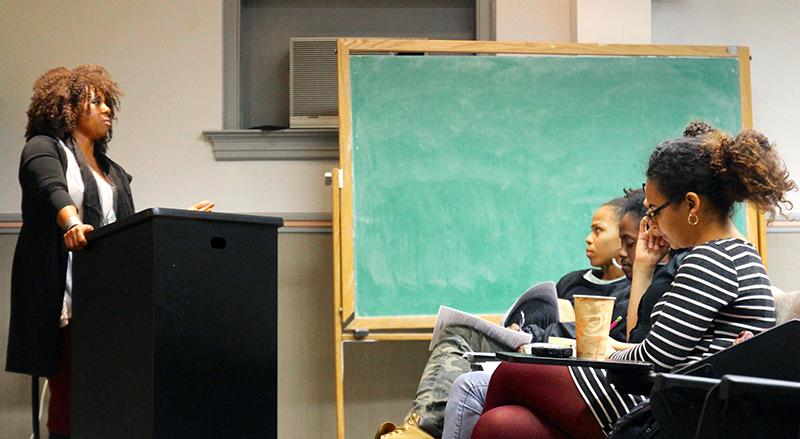Search for MRC Director Continues as Candidates Visit College
Briana Santiago, Staff photographer
Dr. Carmen Phelps, a Multicultural Resource Center director candidate, speaks to students on Wednesday. Two other candidates, Dr. Millicent Carvalho-Grevious and Dr. Teresita Levy, will visit the College Friday and Monday, respectively.
December 12, 2015
Only three candidates remain in the search for the new director of the Multicultural Resource Center.
The first candidate to visit was Dr. Carmen Phelps, the director of Student Engagement for the Office of Institutional Diversity, Equity, Advocacy and Leadership at Temple University and author of the 2012 book, Visionary Women Writers of Chicago’s Black Arts Movement.
A native of Ferguson, MO, Phelps produces multicultural and social justice programs and advocates for Temple’s student body. Phelps holds a B.A. and a B.S. in journalism and African-American studies, respectively, from the University of Kansas, Lawrence; an M.A. in English from Chicago State University; and a Ph.D. in literature with a focus on activist writing at George Washington University.
“It’s very important to me that students feel comfortable to share their stories with me and not just because we want them to come together, or I want them to come together and have these kumbaya moments, but because [the students’ experiences] are intended to be used in forming policy,” Phelps said.
The MRC Director Search Committee held the first student listening session for one of the three job candidates on Wednesday. The session included a 15-minute presentation by Phelps, followed by a 75-minute question and answer session open to the audience.
The Search Committee, composed of six administrators, five student representatives and three faculty members, was present at this open forum along with other students.
During her presentation, Phelps focused on prioritizing students’ experiences when discussing her vision for the MRC here at Oberlin.
“There has to be integration between the theoretical and the lived, the academic and the practical,” Phelps said. “Ultimately, we prioritize these living experiences that are going to feed into our approaches in advancing social justice on this campus.”
Phelps also called upon students in the room to challenge themselves in further advancing social justice on campus.
“There is incredible legacy here at Oberlin, and I fully appreciate that,” Phelps said. “But I just would really like to see that you all begin to challenge yourselves a lot more in these areas, to think about your respective roles in this work for what I identify [as] majority students, allies and advocates, underrepresented groups, students of color, LGBTQIA+ communities, first-gen, socioeconomically disadvantaged students, students with disabilities, international students, etc. You all start to do more when you come to think about [what] your unique experiences and challenges are on this campus.”
Students were invited to ask questions and provide feedback during the session. Isabella Ruston, program associate for the MRC and a College sophomore, said that it is important for an MRC director to build trust and relationships with students, foster a protective environment and also provide support for demands by activists in diverse communities.
“Creating a space where interpersonal relationships can be built — that is accessible to the multiple, intersecting, underrepresented communities — is vital,” Ruston said. “I would want the MRC director to be committed to creating these ‘diverse’ spaces at the same time as supporting [the] radical and political needs that specific communities have voiced for what sounds like has been a long time on this campus.”
College first-year Mackenzie Lew said that the MRC director should be able to communicate well between the students and the administration, as well as be able to support students in many different ways.
“I think being accessible to students is the most important thing,” Lew said. “After going to the listening session, I’m excited to be more involved in what the MRC does but also how it follows its mission in helping underrepresented students.”
The campus feedback from earlier this semester has been vital to the Search Committee’s decision making in arriving at the three selected candidates, according to David Kamitsuka, chair of the Committee and associate dean of the curriculum.
“We spent the first several weeks of the semester listening to students, faculty and staff about their assessment of the MRC and their hopes for its future,” Kamitsuka wrote in an email to the Review. “Ultimately, over 100 students, faculty and staff provided feedback.”
Kamitsuka also said that the feedback received had a direct influence on the job description of the Director of the MRC and Associate Dean of Students position and will continue to guide the selection process.
The other two listening sessions will be held on Friday, Dec. 11 at 4:30 p.m. and Monday, Dec. 14 at 4:30 p.m. at Wilder Hall, Room 101.
Dr. Millicent Carvalho-Grevious, a contract mediator and individualized education program facilitator for the Office of Dispute Resolution at the Pennsylvania Department of Education, will engage in a similar presentation on Friday; Dr. Teresita Levy, an associate professor of Latin American and Puerto Rican Studies at Lehman College and associate director of the Center for Latin American, Caribbean, and Latino Studies at City University of New York, will visit on Monday.
















